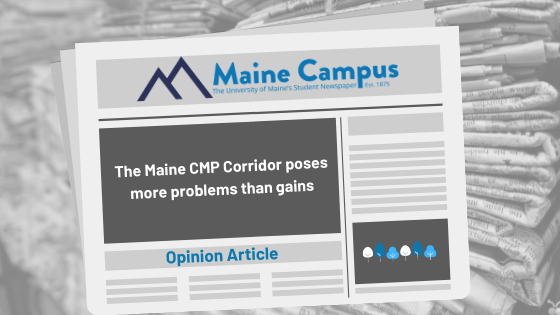Mainers are polarized over whether or not to allow Central Maine Power (CMP) to build its 145-mile long corridor through western Maine. CMP wishes to deliver hydroelectric energy from Canada to Massachusetts through this corridor. Advocates of the corridor allege that allowing the corridor to be built will create Maine jobs, will cost Maine nothing since Massachusetts is paying for it, will promote clean hydroelectric energy instead of fossil fuels and will largely be built alongside existing power lines so as to not be more destructive of Maine’s wilderness than necessary. However, this argument is flawed as this corridor offers more problems than gains for Maine.
Creating the corridor would not economically benefit Maine. Advocates claim that creating this corridor would create 1,600 Maine jobs. However, these jobs would only be temporary. Maine needs long term economic development based on sustainable careers, not temporary jobs that expire in a few years. CentralMaine.com even states that CMP has not confirmed if all 1,600 of these temporary jobs will be fulfilled by Mainers. The $10 million penalty that CMP recently paid to the Maine Public Utilities Commission for wrongful billing, customer complaints and price hikes only attests to the power giant’s financial greed.
The National Resources Council of Maine (NRCM) states that the corridor will not create any new net power. Instead, it will only direct hydroelectric power originally created for New York or Ontario to Massachusetts instead. The corridor also serves the Canadian company Hydro-Electric, instead of allowing a Maine company to possibly fill this need. CMP, Hydro-Quebec and Massachusetts will see benefits, but Maine will only see temporary jobs and a disruption of our western woods, all for Massachusetts to derive energy which would have been used elsewhere.
The CMP corridor will immensely disrupt our natural resources. Advocates argue that it will mostly be built alongside existing power lines and that part of it will go beneath the Kennebec River. However, CMP will still need to cut an additional 53 miles through the Maine woods, and there will be some widening of paths. The Portland Press Herald describes how some areas may be wider than 250 feet. Additionally, the Land Use Planning Commission (LUPC) argues that drilling to place power lines beneath the Kennebec River, while preserving the scenery, would still be tremendously expensive and ecologically disruptive. Bill Gilmore of the LUPC argues that allowing this corridor to be built could establish a dangerous precedent since it will intersect the largest section of wilderness east of the Mississippi. These environmental decisions should not be made based on short term economic gains and temporary jobs. Considering how over 20 towns have rescinded support for the corridor, and CMP still needs permission from the Maine Department of Environmental Protection, many Mainers see how disruptive the power corridor will be to our quintessential forests.
Despite what CMP and its advocates proclaim, the corridor will not actually promote clean energy. Even Massachusetts’ own attorney general argues that this corridor will likely not reduce toxic carbon emissions. Despite the proposed corridor linking hydroelectric power from Canada to Massachusetts, Hydro-Quebec will still need to provide power to the customers it is bypassing in order to serve Massachusetts. This power to Hydro-Quebec’s original customers will likely be produced by burning fossil fuels. The NRCM argues that this corridor is only using existing hydroelectric power instead of generating new sources of clean energy, so it will not reduce CO2 emissions at all. Instead, deforesting over 50 miles of the Maine woods will harm the environment. While hydroelectric power has environmental potential, the construction of dams and turbines also poses environmental risks. Opponents of the corridor also claim that the corridor would impact deer, trout, and other animals, due to blocking or removing parts of their habitats.
The CMP corridor is an atrocious deal for Maine. Maine would not economically benefit, the corridor would be detrimental to our western forests, and the corridor does not promote clean energy. If this issue comes on the ballot this November, consider voting against the reckless CMP corridor.




